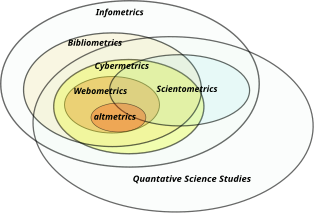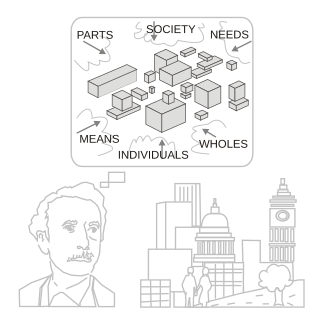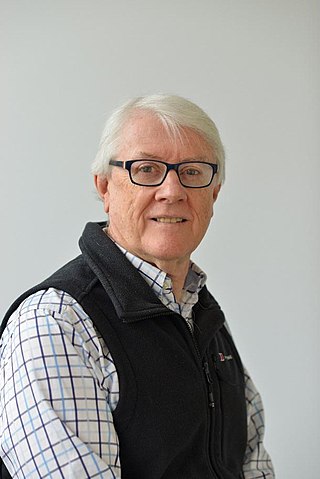Related Research Articles
Systems theory is the interdisciplinary study of systems, i.e. cohesive groups of interrelated, interdependent components that can be natural or human-made. Every system has causal boundaries, is influenced by its context, defined by its structure, function and role, and expressed through its relations with other systems. A system is "more than the sum of its parts" by expressing synergy or emergent behavior.

Anthony Stafford Beer was a British theorist, consultant and professor at the Manchester Business School. He is best known for his work in the fields of operational research and management cybernetics.

Information science is an academic field which is primarily concerned with analysis, collection, classification, manipulation, storage, retrieval, movement, dissemination, and protection of information. Practitioners within and outside the field study the application and the usage of knowledge in organizations in addition to the interaction between people, organizations, and any existing information systems with the aim of creating, replacing, improving, or understanding the information systems.
Frederick Edmund Emery was an Australian psychologist. He was one of the pioneers in the field of organizational development, particularly in the development of the theory around participative work design structures such as self-managing teams. He was widely regarded as one of the finest social scientists of his generation.
Activity theory is an umbrella term for a line of eclectic social-sciences theories and research with its roots in the Soviet psychological activity theory pioneered by Sergei Rubinstein in the 1930s. It was later advocated for and popularized by Alexei Leont'ev. Some of the traces of the theory in its inception can also be found in a few works of Lev Vygotsky. These scholars sought to understand human activities as systemic and socially situated phenomena and to go beyond paradigms of reflexology and classical conditioning, psychoanalysis and behaviorism. It became one of the major psychological approaches in the former USSR, being widely used in both theoretical and applied psychology, and in education, professional training, ergonomics, social psychology and work psychology.

Systems science, also referred to as systems research, or, simply, systems, is an interdisciplinary field concerned with understanding systems—from simple to complex—in nature, society, cognition, engineering, technology and science itself. The field is diverse, spanning the formal, natural, social, and applied sciences.

Russell Lincoln Ackoff was an American organizational theorist, consultant, and Anheuser-Busch Professor Emeritus of Management Science at the Wharton School, University of Pennsylvania. Ackoff was a pioneer in the field of operations research, systems thinking and management science.
Second-order cybernetics, also known as the cybernetics of cybernetics, is the recursive application of cybernetics to itself and the reflexive practice of cybernetics according to such a critique. It is cybernetics where "the role of the observer is appreciated and acknowledged rather than disguised, as had become traditional in western science". Second-order cybernetics was developed between the late 1960s and mid 1970s by Heinz von Foerster and others, with key inspiration coming from Margaret Mead. Foerster referred to it as "the control of control and the communication of communication" and differentiated first order cybernetics as "the cybernetics of observed systems" and second-order cybernetics as "the cybernetics of observing systems". It is closely allied to radical constructivism, which was developed around the same time by Ernst von Glasersfeld. While it is sometimes considered a break from the earlier concerns of cybernetics, there is much continuity with previous work and it can be thought of as a distinct tradition within cybernetics, with origins in issues evident during the Macy conferences in which cybernetics was initially developed. Its concerns include autonomy, epistemology, ethics, language, reflexivity, self-consistency, self-referentiality, and self-organizing capabilities of complex systems. It has been characterised as cybernetics where "circularity is taken seriously".

Participatory action research (PAR) is an approach to action research emphasizing participation and action by members of communities affected by that research. It seeks to understand the world by trying to change it, collaboratively and following reflection. PAR emphasizes collective inquiry and experimentation grounded in experience and social history. Within a PAR process, "communities of inquiry and action evolve and address questions and issues that are significant for those who participate as co-researchers". PAR contrasts with mainstream research methods, which emphasize controlled experimentation, statistical analysis, and reproducibility of findings.
Management cybernetics is concerned with the application of cybernetics to management and organizations. "Management cybernetics" was first introduced by Stafford Beer in the late 1950s and introduces the various mechanisms of self-regulation applied by and to organizational settings, as seen through a cybernetics perspective. Beer developed the theory through a combination of practical applications and a series of influential books. The practical applications involved steel production, publishing and operations research in a large variety of different industries. Some consider that the full flowering of management cybernetics is represented in Beer's books. However, learning continues.
Gerard de Zeeuw is a Dutch scientist and Emeritus professor Mathematical modelling of complex social systems at the University of Amsterdam in the Netherlands. He is known for his work on the theory and practice of action research, particularly on the "Problems of increasing competence", "Second order organisational research" and "Three phases of science: A methodological exploration".
Michael Christopher Jackson OBE is a British systems scientist, consultant and Emeritus Professor of Management Systems and former Dean of Hull University Business School, known for his work in the field of systems thinking and management.
Critical systems thinking (CST) is a systems approach designed to aid decision-makers, and other stakeholders, improve complex problem situations that cross departmental and, often, organizational boundaries. CST sees systems thinking as essential to managing multidimensional 'messes' in which technical, economic, organizational, human, cultural and political elements interact. It is critical in a positive manner because it seeks to capitalize on the strengths of existing approaches while also calling attention to their limitations. CST seeks to allow systems approaches such as systems engineering, system dynamics, organizational cybernetics, soft systems methodology, critical systems heuristics, and others, to be used together, in a responsive and flexible way, to maximize the benefits they can bring.

Cybernetics is a wide-ranging field concerned with circular causal processes such as feedback. Norbert Wiener named the field after an example of circular causal feedback—that of steering a ship where the helmsman adjusts their steering in response to the effect it is observed as having, enabling a steady course to be maintained amongst disturbances such as cross-winds or the tide.

Alexander Laszlo (*1964) is a polycultural systems scientist, currently residing in Argentina.

Raymond L. (Ray) Ison is an Australian-British cybernetician, systems scholar/scientist, and Professor of Systems at the Open University in the UK. He is currently President of the International Federation for Systems Research (IFSR). He was also Professor Systems for Sustainability at Monash University, and fellow at the Centre for Policy Development, and President of the International Society for the Systems Sciences in the year 2014-15. He is known for his work on systems praxeology within rural development, sustainable management, systemic governance and the design and enactment of learning systems.
Systemic design is an "interdiscipline" that integrates systems thinking and design practices. It is a pluralistic field, with several "dialects" including systems-oriented design. Influences have included critical systems thinking and second-order cybernetics. In 2021, the Uk Design Council began advocating for a systemic design approach and embedded it in a revision of their double diamond model.
Laurence Dale Richards was a key figure in the modern development of cybernetics as a transdisciplinary field of inquiry, often referred to as the new cybernetics. He was the first to create interdisciplinary masters and doctoral programs in engineering management, with curricula built explicitly on concepts drawn from systems theory and cybernetics. He served as President for both the American Society for Cybernetics (1986–88) and the American Society for Engineering Management (1998–99) and was elected an Academician in the International Academy for Systems and Cybernetic Sciences in 2010.
References
- 1 2 Emery, M. (2000). The Current Version of Emery's Open Systems Theory , Systemic Practice and Action Research, 2000 - Springer.
- ↑ Donald W. de Guerre (2016). Open Systems Theory and the Two-‐Stage Model of Active Adaptation at stsroundtable.com.
- ↑ Bushe, G.R. & Marshak, R.J. (2016) The Dialogic Organization Development Approach to Transformation and Change . In Rothwell, W. Stravros, J., & Sullivan R. (eds.) Practicing Organization Development 4th Ed. (407-418). San Francisco, Wiley.
- ↑ Interview at European Meetings on Cybernetics and Systems Research 2012: emcsr.net and YouTube
- ↑ Merrelyn Emery held the traditional W. Ross Ashby Memorial Lecture sponsored by the International Federation for Systems Research (IFSR) at the European Meetings on Cybernetics and Systems Research in Vienna 2012.
- ↑ Interview on the Team Human Podcast
- ↑ de Guerre, D. W. & Deering, P. (2016). A Practical, Contextual Social Science to Engage the World - Merrelyn Emery and Open Systems Theory. www.socialsciencethatactuallyworks.com